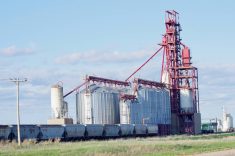Reuters — PotashCorp, the world’s biggest fertilizer company, on Thursday reported its smallest quarterly profit in four years and produced 2014 forecasts that were well below Wall Street expectations.
The Saskatoon-based company’s disappointing outlook shows the global potash market has far to go to recover from a slide in prices, due to years of soft demand, burgeoning supplies and last summer’s breakup of rival Belarusian Potash Co. (BPC).
Shares of PotashCorp, the world’s biggest producer of the crop nutrient by capacity, dropped 1.5 per cent in New York to $31.35 by early afternoon, paring earlier losses when shares hit their lowest level in three months.
Read Also

Pulse Weekly: SPG looks back at harvest, ahead to trade
Saskatchewan Pulse Growers executive director Carl Potts said this year’s harvest had strong yields as the organization now works on international trade.
Potash said it expected a first-quarter profit of 30 to 35 cents per share, widely missing analysts’ average estimate of 48 cents, according to Thomson Reuters I/B/E/S.
For the full year 2014, the company forecast a profit of $1.40 to $1.80 a share. That would be even lower than its performance during the disappointing past year, when it earned $2.04 per share, and the outlook fell well below analysts’ average 2014 view of $2 earnings per share.
The mid-point of that 2014 profit range, $1.60 per share, would represent PotashCorp’s least profitable year since global potash prices collapsed in 2009.
“The whole potash saga, which commenced with Uralkali (quitting BPC) last year, has been bouncing investors left, right and center,” said John Goldsmith, vice-president and deputy head of equities at Montrusco Bolton Investments, which owns PotashCorp stock.
Even so, 2014 looks like a bottom year for PotashCorp, he said, with more attractive fundamentals falling into place after that. PotashCorp is operating at a relatively low rate compared to capacity and cheap prices may start to stimulate demand, Goldsmith said.
PotashCorp said in December that it would slash its workforce by 18 per cent, curtailing potash production at some facilities.
The company launched an 11-year, $8 billion expansion of potash capacity in 2003 that is now 93 per cent complete.
CEO Bill Doyle said production capacity won’t stay idle indefinitely.
“I think that you’re going to see us using the expansion capability that we’ve had in the next five-year period,” Doyle said on a conference call. “Three to five years out, you’re going to see us utilizing that.”
Potash buyers retreated to the sidelines last year, expecting prices to fall further. Chinese buyers agreed this month to new potash contracts, but locked in deep discounts at prices that usually set the global floor.
Russia’s Uralkali, the world’s top potash producer, was forced to slash prices by 24 percent in a new semi-annual supply deal with China, announced on Jan. 20. Canpotex Ltd, the export arm of Potash Corp, Mosaic Co and Agrium Inc, struck its own deal shortly after for 700,000 tonnes at an undisclosed price.
2014 sales forecasts
PotashCorp said it expected to sell 8.2 to 8.6 million tonnes of potash in 2014, up from last year’s 8.1 million tonnes. It said total global shipments of potash look to reach 55 million to 57 million tonnes in 2014, up five per cent.
The mid-point of PotashCorp’s forecasted potash sales volume would represent less than four per cent growth, trailing the expected five per cent uptick in global sales, said Spencer Churchill, analyst at Paradigm Capital.
The company’s initial midpoint of guidance for year-ahead potash shipments has ended up too optimistic for three straight years, said BMO Nesbitt Burns analyst Joel Jackson, in a note.
Net earnings for the fourth quarter fell 45 percent to $230 million, or 26 cents per share, from $421 million, or 48 cents per share, a year earlier. Those results included $60 million in severance-related costs, or five cents per share.
Revenue dropped to $1.54 billion.
Analysts on average expected Potash Corp to earn 33 cents a share in the fourth quarter on sales of $1.357 billion.
Prices of all three nutrients the company produces — potash, phosphate and nitrogen — fell during the most recent period, but sales volumes were higher year over year.
The company’s potash sales climbed 34 per cent to nearly 1.8 million tonnes in the fourth quarter. Potash Corp’s average realized price of potash fell 27 per cent to $282 per tonne.
PotashCorp’s average realized price for phosphate fell 21 percent to $455 per tonne, while its average price for nitrogen tumbled 29 percent to $326 per tonne.
— Rod Nickel is a Reuters correspondent based in Winnipeg.
Related story:
PotashCorp to cut production, shut plants, lay off over 1,000, Dec. 3, 2013
















